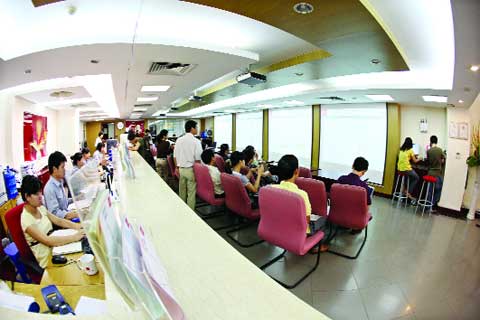Sector’s journey has just began
As the 10th anniversary of the Ho Chi Minh Stock Exchange on July 27 looms, Dragon Capital CEO Dominic Scriven looks back at his business start-up days in Vietnam and explains why working in the finance investment sector is not always plain sailing, but a prosperous future voyage awaits.
 The nation’s financial markets have come a long way in the past decade |
Despite oceans of sorrows of wars, Vietnamese people were not submerged in pain from the past and always had positive thoughts about the future. When I met such people, I thought this land must offer lots development opportunities and potential.
I came back to Vietnam in 1992 and took a Vietnamese language course at the Hanoi National University. After nearly two years, I was so seduced by the life and people here that in 1993 I decided to seek a job in Ho Chi Minh City. In 1994, on anticipation of a promising local stock market in the future, some friends and I decided to set up a finance investment company.
Dragon Capital made its presence when a legal framework for capital market development was not in place. It was then very tough to convince foreign investors to buy into Vietnam. Where ever there were finance companies, we came. But 140 out of the 150 companies we talked to declined to invest in this market.
In 1995, we established the Vietnam Enterprise Investments Limited (VEIL), a $16.5 million overseas Vietnam-dedicated investment fund. My friends, relatives, even my mum, dad and sister were the first shareholders. In the first two months, given the context then, I had almost no salary.
By the mid 1990s, Vietnam had six foreign investment funds. After the Asian financial crisis in 1997-1998, all those funds either broke even or made losses. Foreign funds like Lazard, Templeton, Vietnam Fund and Vietnam Frontier Fund either pulled out of Vietnam or downsized their operations.
Many people at the time asked me about divestment, but we still upheld our long-term stance and anchored our trust in Vietnam’s economic vitality and opportunities.
Four years later, however, as the effects of the crisis lingered on, we began to fall into losses. Within six years, I burned out nearly one-third of the fund’s equity. In the first two years, I told my mum: “Mum, profit is tiny but it’s not a hole in our pocket”. The following four years I said: “Mum, we have lost one-third of the investment capital.” My mum just kept silent.
In July 20, 2000, we witnessed the debut of the Ho Chi Minh stock trading centre, now the Ho Chi Minh Stock Exchange (HoSE), the first bourse in Vietnam. Dragon Capital on July 27, 2000 was the first foreign investor to receive a trading code.
The years 2006 and 2007 saw the overheated growth of the VN-Index, the barometer of the HoSE, hitting more than 1,000 points. Soon afterwards, the world grappled with an economic recession originating from a financial crisis in the US. Though Vietnam was not in the epicentre, the economic earthquake dragged the index sharply down to a record low of 235 points. So again we and many others battled to ride out the crisis.
Ten years is not a long journey but we can be proud to say that after much turbulence, the position and role of Vietnam’s stock market have left big imprints. Along with the market, Dragon Capital has tasted “the sweet and the bitter sides of life”.
Today, Vietnam has a rather busy stock market with two official stock exchanges, one market for unlisted public firms (UPCoM), one million trading accounts of which many are of foreigners, more than 100 securities companies and nearly 50 fund management firms.
For next development steps, we need to build up a complete and comprehensive legal framework and standardise market activities, scale-up the market and raise its quality to heighten the trust of market players. The market needs new products, new devices, tools and measures to make investors invest efficiently while catering for capital demand of enterprises and the economy.
At the start-up in late 1994 from an initial base of $16.4 million and eight staff, Dragon Capital now manages around $1.3 billion with a headcount in excess of 100, investing in more than 60 listed firms in Vietnam.
Our aim is to become a catalyst to draw investment from foreign individuals and institutions into Vietnamese firms and make the two robustly develop hand-in-hand. Thus, we do not only care about the market today, but also its future. After 10 years, I think the game has just started.
What the stars mean:
★ Poor ★ ★ Promising ★★★ Good ★★★★ Very good ★★★★★ Exceptional
Latest News
More News
- Cashless payments hit 28 times GDP in 2025 (February 04, 2026 | 18:09)
- SSIAM and DBJ launch Japan Vietnam Capital Fund (February 04, 2026 | 15:57)
- Banks target stronger profits, credit growth in 2026 (February 04, 2026 | 15:43)
- Vietnam on path to investment-grade rating (February 03, 2026 | 13:07)
- Consumer finance sector posts sharp profit growth (February 03, 2026 | 13:05)
- Insurance market building the next chapter of protection (February 02, 2026 | 11:16)
- NAB Innovation Centre underscores Vietnam’s appeal for tech investment (January 30, 2026 | 11:16)
- Vietnam strengthens public debt management with World Bank and IMF (January 30, 2026 | 11:00)
- Corporate bond market poised for stronger growth cycle (January 28, 2026 | 17:13)
- Vietnam's IPO market on recovery trajectory (January 28, 2026 | 17:04)
















 Mobile Version
Mobile Version